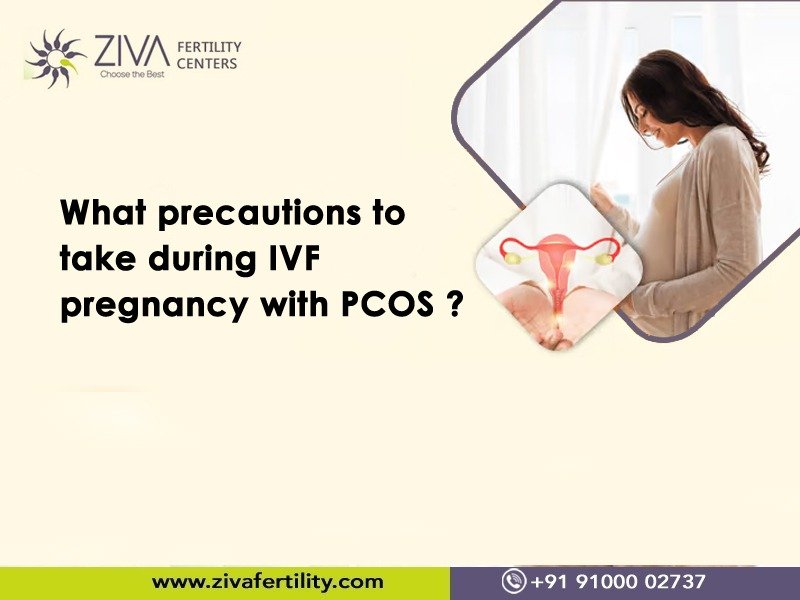Polycystic ovary syndrome (PCOS) is a hormonal disorder of the reproductive hormones, which can lead to ovarian issues. Ovulation is part of the natural cycle where healthy ovaries release an egg once a month. This matured egg is fertilized by the sperm during intercourse.
PCOS interferes with ovulation by stopping a woman’s ovaries from releasing the egg once a month. The main issue is that in women with PCOS, their ovaries will produce an abnormally high level of androgens (male sex hormones), which are normally only present in trace amounts in women. A higher-than-normal level of androgens interferes with menstrual cycle issues and the body doesn’t produce adequate hormones for ovulation. PCOS manifests as irregular or absent periods. All these issues make pregnancy more challenging.
Symptoms to watch out for to detect PCOS at an early stage
PCOS gives a lot of warning signs so one has to look out for signs like
- Abnormal periods
- Infertility
- Weight gain
- Extreme acne
- Severe fatigue
- Depression
- Excessive facial and body hair growth
- Scalp hair thinning
Symptoms such as extra facial hair and acne are due to the increased levels of androgen hormone. All women have the male hormones but in PCOS condition their level increases causing hormonal imbalance.
Why should women with PCOS follow precautions during pregnancy?
Women with PCOS are more likely to experience pregnancy-related difficulties such as:
Early pregnancy loss or miscarriage: Studies have indicated that women with PCOS have an increased risk of miscarriage.
High blood pressure during pregnancy: During the second half of the pregnancy high blood pressure can occur. If left untreated this leads to pre-eclampsia. During delivery also an increased blood pressure might potentially have an impact.
Pre-eclampsia: In this condition, there is a dangerous rise in blood pressure accompanied by leg swelling and protein in the urine. If left untreated it could lead to eclampsia, damaging the kidneys and liver. Seizures are also common during eclampsia.
Gestational diabetes: Gestational diabetes means the expecting mother’s blood sugar levels rise but usually come back to normal after the baby is born.
Preterm deliveries: If in PCOS, the androgen levels in the blood are high, preterm deliveries could occur. Preterm delivery could be due to an incompetent cervix and high blood pressure.
Conditions in which PCOS women opt for IVF
In reality, if PCOS women have a healthy lifestyle, take proper PCOS treatment for pregnancy and manage it efficiently they can naturally conceive. But under the following conditions they have to opt for an IVF:
- Medication to treat PCOS didn’t work.
- Surgery is not an option.
- Lifestyle changes aren’t working.
In the above conditions, in vitro fertilization may be a great choice. In the IVF procedure, the woman’s eggs are fertilized along with a male partner or a donor sperm in the laboratory. The embryo after fertilization, is then transplanted into the female uterus. In vitro fertilization has a high success rate and reduces the risks of triple births.
In vitro, fertilization helps women with PCOS and is also a great choice for women dealing with endometriosis conditions and men with infertility issues.
What precautions to take during IVF pregnancy with PCOS?
A healthy IVF pregnancy with PCOS is completely possible. They have to take the following precautions :
- A proper lifestyle means they have to modify their diet in such a way that it aids in maintaining their weight.
- Diet is also crucial to balance the hormones.
- Continuing follow-ups and not missing any of them. The pregnancy has to be managed carefully so women should keep up with the appointments.
- Take timely medication as suggested by the doctor. To achieve an IVF pregnancy, women are given ovarian stimulation medication. These medications help women release more than one egg during ovulation which is fertilized in the lab.
- After achieving pregnancy with IVF the expecting mother should have an active lifestyle.
- They should exercise regularly.
- Maintain an ideal weight so monitor it periodically.
- Monitor the blood sugar levels and consult your doctor if the levels are varying.
- High protein content helps in stabilizing the blood sugar levels.
- Make a balanced diet containing whole fiber, proteins, and healthy fats.
- Avoid alcoholic beverages and reduce caffeine intake completely.
A word from ZIVA fertility clinics
PCOS is becoming common in women and can be managed with proper medical intervention and efficient lifestyle changes. These changes also promote a healthy pregnancy in women with PCOS. After pregnancy with IVF, it should be managed efficiently to avoid any complications or risks. Please take all the prescribed medications. Care is also needed to ensure that PCOS-related complications do not come back again after delivery. We at ZIVA fertility clinics have decades of experience handling IVF pregnancies in PCOS women. For more information, please visit our website https://zivafertility.com/ or contact us at +91-9100002737 or +91-9347406900
















